人教版2023年中考英语语法复习专题 过去完成时 课件 (共45张PPT)
文档属性
| 名称 | 人教版2023年中考英语语法复习专题 过去完成时 课件 (共45张PPT) |

|
|
| 格式 | zip | ||
| 文件大小 | 5.7MB | ||
| 资源类型 | 教案 | ||
| 版本资源 | 人教新目标(Go for it)版 | ||
| 科目 | 英语 | ||
| 更新时间 | 2022-08-04 19:25:42 | ||
图片预览

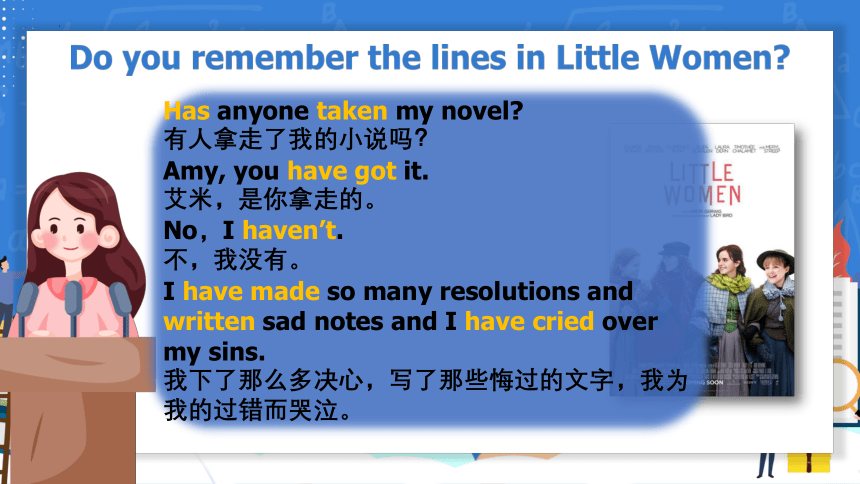
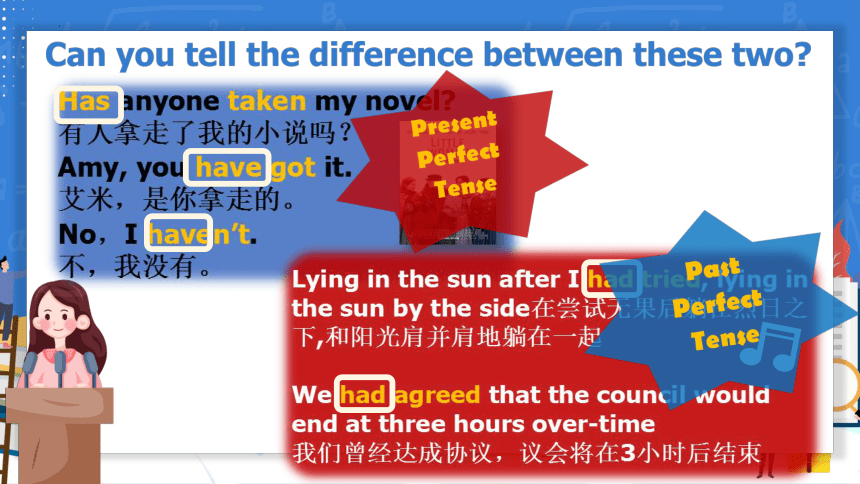
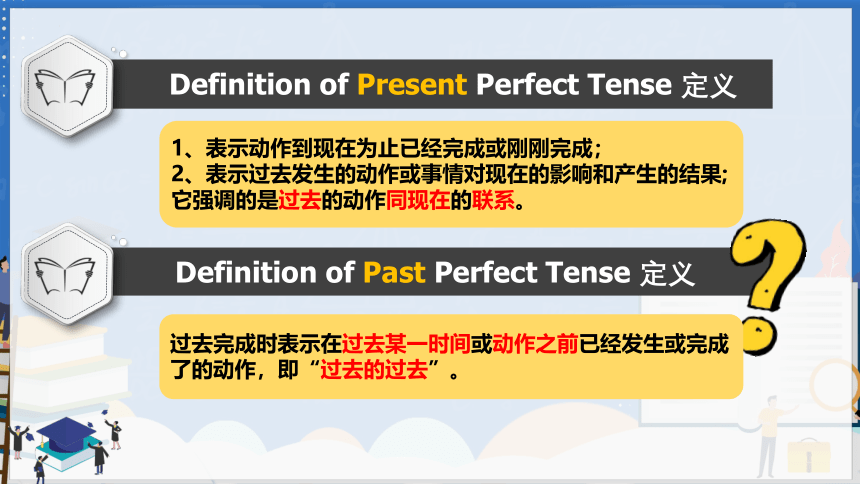
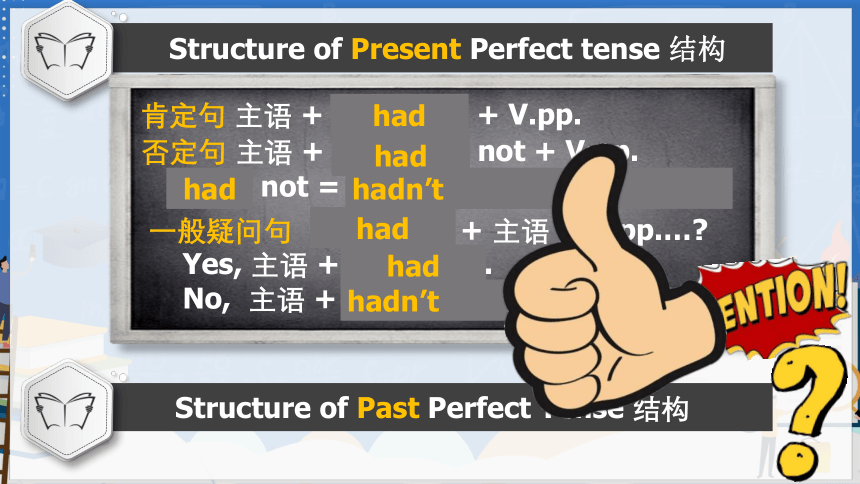

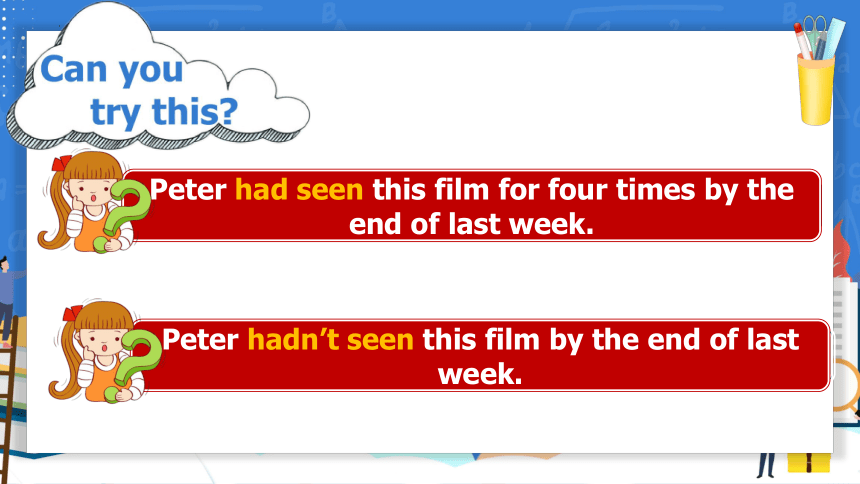
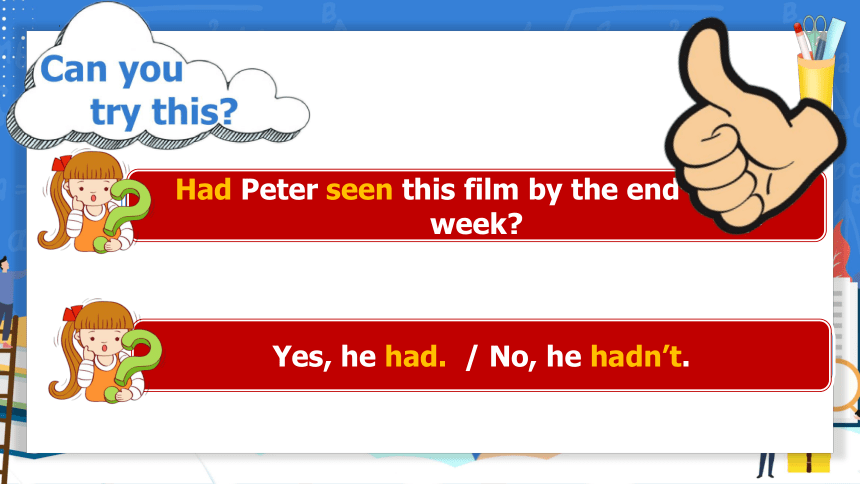

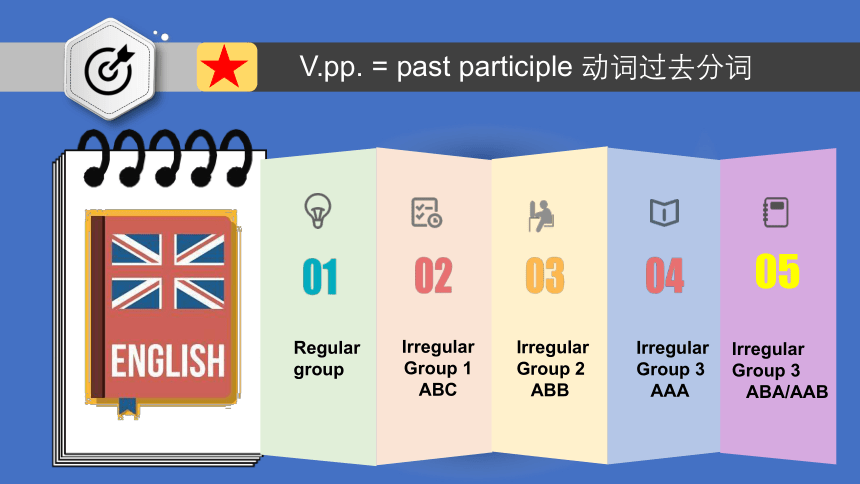
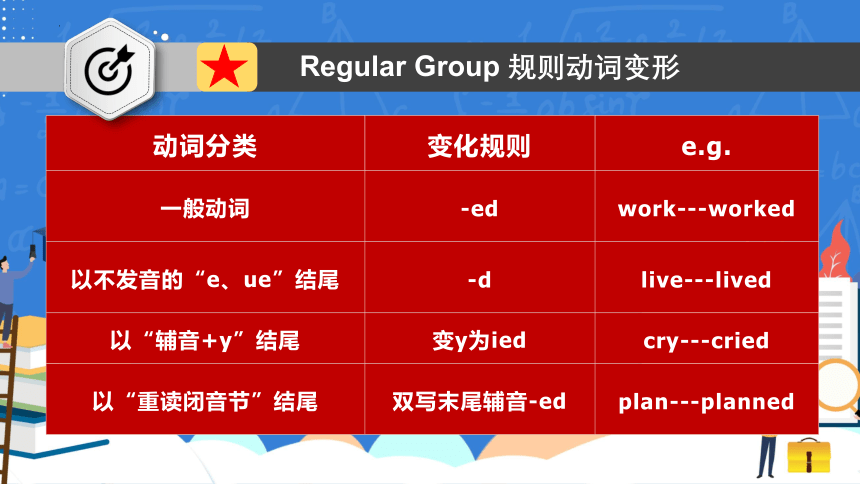
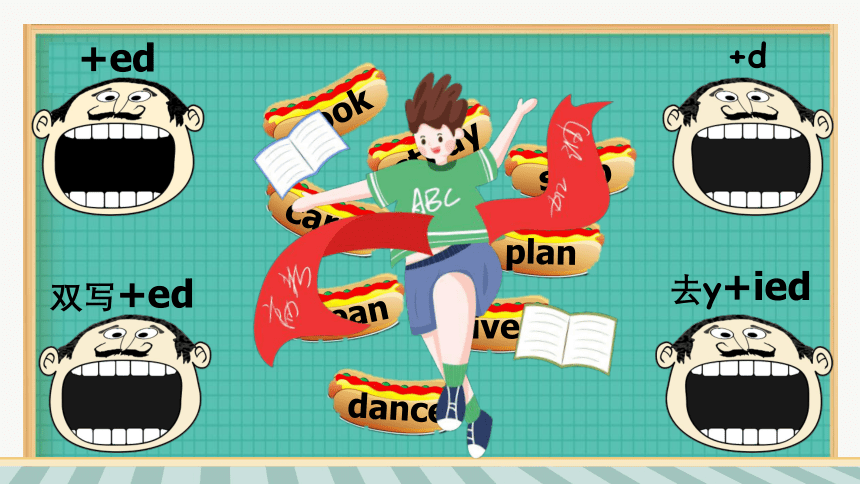
文档简介
(共45张PPT)
过去完成时
中考语法复习之
Past Perfect Tense
Present
Perfect
Tense
Do you remember the lines in Little Women
Has anyone taken my novel
有人拿走了我的小说吗?
Amy, you have got it.
艾米,是你拿走的。
No,I haven’t.
不,我没有。
I have made so many resolutions and written sad notes and I have cried over my sins.
我下了那么多决心,写了那些悔过的文字,我为我的过错而哭泣。
Can you tell the difference between these two
Definition of Present Perfect Tense 定义
1、表示动作到现在为止已经完成或刚刚完成;
2、表示过去发生的动作或事情对现在的影响和产生的结果;它强调的是过去的动作同现在的联系。
Definition of Past Perfect Tense 定义
过去完成时表示在过去某一时间或动作之前已经发生或完成了的动作,即“过去的过去”。
Structure of Present Perfect tense 结构
Structure of Past Perfect Tense 结构
肯定句 主语 + have/has + V.pp.
否定句 主语 + have/has not + V.pp.
have not = haven’t / has not = hasn’t
一般疑问句 Have/Has + 主语 + V.pp.…
Yes, 主语 + have/has.
No, 主语 + haven’t /hasn’t.
had
had
had
hadn’t
had
had
hadn’t
Can you
try this
截止到上周Peter已经看过四遍这部电影了。
Peter had seen this film for four times by the end of last week.
截止到上周Peter还没看过这部电影。
Peter hadn’t seen this film by the end of last week.
截止到上周Peter看过这部电影了吗?
Had Peter seen this film by the end of last week
看过了/没看过
Yes, he had. / No, he hadn’t.
How can
we get the V.pp
Let’s
review
V.pp. = past participle 动词过去分词
01
02
03
Regular
group
Irregular
Group 1
ABC
Irregular
Group 2
ABB
04
Irregular
Group 3
AAA
Irregular
Group 3
ABA/AAB
05
动词分类 变化规则 e.g.
一般动词 -ed work---worked
以不发音的“e、ue”结尾 -d live---lived
以“辅音+y”结尾 变y为ied cry---cried
以“重读闭音节”结尾 双写末尾辅音-ed plan---planned
Regular Group 规则动词变形
+ed
双写+ed
+d
去y+ied
cook
plan
study
clean
live
stop
carry
dance
Irregular Group 1 AAA
动词原形 过去式 过去分词 动词原形 过去式 过去分词
bet bet bet cut cut cut
cost cost cost hit hit hit
hurt hurt hurt let let let
put put put read read read
set set set shut shut shyt
broadcast broadcast broadcast burst burst burst
quit quit quit shed shed shed
Irregular Group 2 ABB
动词原形 过去式 过去分词 动词原形 过去式 过去分词
buy bought bought bring brought brought
dream dreamt dreamt learn learnt learnt
bleed bled bled catch caught caught
feed fed fed find found found
hang hung hung have had had
bend bent bent dig dug dug
feel felt felt build built built
Irregular Group 3 ABC
动词原形 过去式 过去分词 动词原形 过去式 过去分词
arise arose arisen be was/were been
bear bore born beat beat beaten
bit bit bitten blow blew blown
break broke broken do did done
draw drew drawn drive drove driven
eat ate eaten fly flew flown
give gave given know knew known
Irregular Group 4 ABA/AAB
ABA
AAB
come came come
become became become
overcoem overcame overcome
run ran run
beat beat beaten
★
★
Can you
try this
过 去 完 成 时 的 用 法
(1)表示一动作或状态在过去某一时间或动作之前已经完成,即发生在“过去的过去”。这个过去的时间可以用by, before,after, when等介词短语或者一个时间状语从句来表示。
例:上周日之前他们已经种了一百棵树。They had planted 100 trees before last Sunday.
关好门以后,他开了房间。After he had closed the door, he left the room.
When he got to school, he realized
he had left her backpack at home.
过 去 完 成 时 的 用 法
(2)表示某一动作或状态在过去某时之前已经开始,一直延续到这一过去的时间。常用表延续的时间状语如by the end of+过去的时间点, by the time +从句等。
例:到去年年底,她已经换过四次工作了。
By the end of last year, she had changed four jobs.
By the time he got outside, the bus had already left .
过 去 完 成 时 的 用 法
(3)表示过去某一时间之前开始,一直延续到过去的这一时间,而且还可能继续下去的动作。通常与for, since 引导的时间状语连用。
例:从我认识他,他交了很多新朋友。
He had made a lot new friends since last year.
He had done a lot of experiments on his science research since 1988.
过 去 完 成 时 的 用 法
(4)含有宾语从句的复合句中:当主句为一般过去时,且从句的动作先于主句的动作发生时,从句要用过去完成时。如在told,said,knew,heard,thought,realize等动词后的宾语从句中。
例:她说她以前已看过这部电影了。
She said that she had seen the film before.
过 去 完 成 时 的 用 法
(5)表示意向的动词,如hope,wish,expect,think,intend,mean,suppose等,用过去 完成时表示“原本…,但未能…”。
例: 我们本希望你能来,但你没来。
We had hoped that you would come, but you didn’t.
过 去 完 成 时 的 用 法
(6)过去完成时与 as soon as, till/ until 等引导时间状语的从句连用,强调动作发生的时间前后。
例: 我完成作业了就去睡觉了。
Last night, as soon as I had finished my work I went to sleep.
我一直等到他把所有玩具清理好。
I waited until he had cleaned up all his toys.
过 去 完 成 时 的 用 法
(7)过去完成时是一个相对的时态,它所表示的动作不仅发生在过去,更强调“过去的过去”,只有和过去某时或某动作相比较时,才用到它。
— John returned home very late yesterday.
— Where had he been
Exercise
1. After he ______________ (finish) his work he went out.
2. The children ran away after they ___________ (break) the window.
3. I went to Tom’s house but he __________ (go) out.
had finished
had broken
had gone
Exercise
4. Annie told me that his father ____________ ( go ) to Paris and he ____________ ( come ) back in a few days.
5. My friend __________ (buy) the car two years ago. He ________________ (buy) it for two years.
had gone
would come
bought
has had
现在完成时
过去完成时
现在完成时强调一个动作从过去到现在并可能持续到将来;
I have already learned 1000 English words so far.
过去完成时强调一个动作从过去持续到过去并可能继续。
I had already learned 1000 English words till then.
辨别
Attention: 过去完成跟现在完成时共通的地方是他们都可以与already,yet,since,for连用。
一般过去时
过去完成时
一般过去时只强调过去某一特定的时间
They arrived at the station at ten yesterday.
过去完成时在时间上强调“过去的过去”
They had arrived at the station by ten yesterday.
辨别
Attention: 时间状语不同
在没有明确的过去时间状语作标志时,谓语动词动作发生的时间先后须依据上下文来判断:先发生的用过去完成时,后发生的则用一般过去时。
She was very happy. Her whole family were pleased with her, too. She had just won the first in the composition competition.
Attention
The lines in Past Perfect Tense
I went to get dressed and realized I had left my best shirt in the washer!
“过去的过去”
穿衣打扮之前已把衬衫落在了洗衣机
The lines in Past Perfect Tense
After I had waited for a few minutes, I realized I had put my shirt on inside out!
after时间状语从句来表示过去已完成的事;realize后的宾语从句表示过去完成时。
The lines in Past Perfect Tense
This had never happened to me before last night.
事件在过去某一时间之前已经完成,before时间介词短语强调这个过去的时间
The lines in Past Perfect Tense
When I came back, a waiter had given my table to someone else.
发生在“过去的过去”。这个过去的时间可以用when等介词短语或者一个时间状语从句来表示
The lines in Past Perfect Tense
I told the server what had happened.
told等动词引导,当主句为一般过去时,且从句的动作先于主句的动作发生时,从句要用过去完成时.
The lines in Past Perfect Tense
Ann said that she had waited for me for over twenty minutes.
said等动词引导,当主句为一般过去时,且从句的动作先于主句的动作发生时,从句要用过去完成时.
Practice makes perfect
!
Exercise
1.He asked me _____ during the summer holidays.
A. where I had been B. where I had gone
C. where had I been D. where had I gone
A
Exercise
2. What ____ Jane ____ by the time he was sever
A. did, do B. has, done
C did, did. D. had, done
3. I ______ 900 English words by the time I was ten.
A. learned B. was learning
C. had learned D. learnt
D
C
Exercise
4. She ______lived here for ______ years.
A. had, a few B. has, several
C. had, a lot of D. has, a great deal of
5. By the time my parents reached home yesterday, I _____ the dinner already.
A had cooked B. cooked
C. have cooked D. was cooked
B
A
Exercise
1.When I _______ (arrive) at the station, he _________(leave).
2.We _______ (learn) about 4000 English words by the end of last term.
3. I waited until he ____________ (finish) his homework.
4. We were surprised at what she ____already _____(do)
arrived
had left
had learned
(had) finished
had
done
Exercise
5.She ______(not go) to Qingdao because she ______(go) there before.
6. He ______ (not tell) you the news yet.
7. He said he ________already______(give) the book to the teacher.
8. I _______ (be) to Shanghai before.
9. She told me she ________(be) to Sanya three times.
didn't go
had been
hasn't told
had
given
have been
had been
Practice makes perfect
!
过去完成时
中考语法复习之
Past Perfect Tense
Present
Perfect
Tense
Do you remember the lines in Little Women
Has anyone taken my novel
有人拿走了我的小说吗?
Amy, you have got it.
艾米,是你拿走的。
No,I haven’t.
不,我没有。
I have made so many resolutions and written sad notes and I have cried over my sins.
我下了那么多决心,写了那些悔过的文字,我为我的过错而哭泣。
Can you tell the difference between these two
Definition of Present Perfect Tense 定义
1、表示动作到现在为止已经完成或刚刚完成;
2、表示过去发生的动作或事情对现在的影响和产生的结果;它强调的是过去的动作同现在的联系。
Definition of Past Perfect Tense 定义
过去完成时表示在过去某一时间或动作之前已经发生或完成了的动作,即“过去的过去”。
Structure of Present Perfect tense 结构
Structure of Past Perfect Tense 结构
肯定句 主语 + have/has + V.pp.
否定句 主语 + have/has not + V.pp.
have not = haven’t / has not = hasn’t
一般疑问句 Have/Has + 主语 + V.pp.…
Yes, 主语 + have/has.
No, 主语 + haven’t /hasn’t.
had
had
had
hadn’t
had
had
hadn’t
Can you
try this
截止到上周Peter已经看过四遍这部电影了。
Peter had seen this film for four times by the end of last week.
截止到上周Peter还没看过这部电影。
Peter hadn’t seen this film by the end of last week.
截止到上周Peter看过这部电影了吗?
Had Peter seen this film by the end of last week
看过了/没看过
Yes, he had. / No, he hadn’t.
How can
we get the V.pp
Let’s
review
V.pp. = past participle 动词过去分词
01
02
03
Regular
group
Irregular
Group 1
ABC
Irregular
Group 2
ABB
04
Irregular
Group 3
AAA
Irregular
Group 3
ABA/AAB
05
动词分类 变化规则 e.g.
一般动词 -ed work---worked
以不发音的“e、ue”结尾 -d live---lived
以“辅音+y”结尾 变y为ied cry---cried
以“重读闭音节”结尾 双写末尾辅音-ed plan---planned
Regular Group 规则动词变形
+ed
双写+ed
+d
去y+ied
cook
plan
study
clean
live
stop
carry
dance
Irregular Group 1 AAA
动词原形 过去式 过去分词 动词原形 过去式 过去分词
bet bet bet cut cut cut
cost cost cost hit hit hit
hurt hurt hurt let let let
put put put read read read
set set set shut shut shyt
broadcast broadcast broadcast burst burst burst
quit quit quit shed shed shed
Irregular Group 2 ABB
动词原形 过去式 过去分词 动词原形 过去式 过去分词
buy bought bought bring brought brought
dream dreamt dreamt learn learnt learnt
bleed bled bled catch caught caught
feed fed fed find found found
hang hung hung have had had
bend bent bent dig dug dug
feel felt felt build built built
Irregular Group 3 ABC
动词原形 过去式 过去分词 动词原形 过去式 过去分词
arise arose arisen be was/were been
bear bore born beat beat beaten
bit bit bitten blow blew blown
break broke broken do did done
draw drew drawn drive drove driven
eat ate eaten fly flew flown
give gave given know knew known
Irregular Group 4 ABA/AAB
ABA
AAB
come came come
become became become
overcoem overcame overcome
run ran run
beat beat beaten
★
★
Can you
try this
过 去 完 成 时 的 用 法
(1)表示一动作或状态在过去某一时间或动作之前已经完成,即发生在“过去的过去”。这个过去的时间可以用by, before,after, when等介词短语或者一个时间状语从句来表示。
例:上周日之前他们已经种了一百棵树。They had planted 100 trees before last Sunday.
关好门以后,他开了房间。After he had closed the door, he left the room.
When he got to school, he realized
he had left her backpack at home.
过 去 完 成 时 的 用 法
(2)表示某一动作或状态在过去某时之前已经开始,一直延续到这一过去的时间。常用表延续的时间状语如by the end of+过去的时间点, by the time +从句等。
例:到去年年底,她已经换过四次工作了。
By the end of last year, she had changed four jobs.
By the time he got outside, the bus had already left .
过 去 完 成 时 的 用 法
(3)表示过去某一时间之前开始,一直延续到过去的这一时间,而且还可能继续下去的动作。通常与for, since 引导的时间状语连用。
例:从我认识他,他交了很多新朋友。
He had made a lot new friends since last year.
He had done a lot of experiments on his science research since 1988.
过 去 完 成 时 的 用 法
(4)含有宾语从句的复合句中:当主句为一般过去时,且从句的动作先于主句的动作发生时,从句要用过去完成时。如在told,said,knew,heard,thought,realize等动词后的宾语从句中。
例:她说她以前已看过这部电影了。
She said that she had seen the film before.
过 去 完 成 时 的 用 法
(5)表示意向的动词,如hope,wish,expect,think,intend,mean,suppose等,用过去 完成时表示“原本…,但未能…”。
例: 我们本希望你能来,但你没来。
We had hoped that you would come, but you didn’t.
过 去 完 成 时 的 用 法
(6)过去完成时与 as soon as, till/ until 等引导时间状语的从句连用,强调动作发生的时间前后。
例: 我完成作业了就去睡觉了。
Last night, as soon as I had finished my work I went to sleep.
我一直等到他把所有玩具清理好。
I waited until he had cleaned up all his toys.
过 去 完 成 时 的 用 法
(7)过去完成时是一个相对的时态,它所表示的动作不仅发生在过去,更强调“过去的过去”,只有和过去某时或某动作相比较时,才用到它。
— John returned home very late yesterday.
— Where had he been
Exercise
1. After he ______________ (finish) his work he went out.
2. The children ran away after they ___________ (break) the window.
3. I went to Tom’s house but he __________ (go) out.
had finished
had broken
had gone
Exercise
4. Annie told me that his father ____________ ( go ) to Paris and he ____________ ( come ) back in a few days.
5. My friend __________ (buy) the car two years ago. He ________________ (buy) it for two years.
had gone
would come
bought
has had
现在完成时
过去完成时
现在完成时强调一个动作从过去到现在并可能持续到将来;
I have already learned 1000 English words so far.
过去完成时强调一个动作从过去持续到过去并可能继续。
I had already learned 1000 English words till then.
辨别
Attention: 过去完成跟现在完成时共通的地方是他们都可以与already,yet,since,for连用。
一般过去时
过去完成时
一般过去时只强调过去某一特定的时间
They arrived at the station at ten yesterday.
过去完成时在时间上强调“过去的过去”
They had arrived at the station by ten yesterday.
辨别
Attention: 时间状语不同
在没有明确的过去时间状语作标志时,谓语动词动作发生的时间先后须依据上下文来判断:先发生的用过去完成时,后发生的则用一般过去时。
She was very happy. Her whole family were pleased with her, too. She had just won the first in the composition competition.
Attention
The lines in Past Perfect Tense
I went to get dressed and realized I had left my best shirt in the washer!
“过去的过去”
穿衣打扮之前已把衬衫落在了洗衣机
The lines in Past Perfect Tense
After I had waited for a few minutes, I realized I had put my shirt on inside out!
after时间状语从句来表示过去已完成的事;realize后的宾语从句表示过去完成时。
The lines in Past Perfect Tense
This had never happened to me before last night.
事件在过去某一时间之前已经完成,before时间介词短语强调这个过去的时间
The lines in Past Perfect Tense
When I came back, a waiter had given my table to someone else.
发生在“过去的过去”。这个过去的时间可以用when等介词短语或者一个时间状语从句来表示
The lines in Past Perfect Tense
I told the server what had happened.
told等动词引导,当主句为一般过去时,且从句的动作先于主句的动作发生时,从句要用过去完成时.
The lines in Past Perfect Tense
Ann said that she had waited for me for over twenty minutes.
said等动词引导,当主句为一般过去时,且从句的动作先于主句的动作发生时,从句要用过去完成时.
Practice makes perfect
!
Exercise
1.He asked me _____ during the summer holidays.
A. where I had been B. where I had gone
C. where had I been D. where had I gone
A
Exercise
2. What ____ Jane ____ by the time he was sever
A. did, do B. has, done
C did, did. D. had, done
3. I ______ 900 English words by the time I was ten.
A. learned B. was learning
C. had learned D. learnt
D
C
Exercise
4. She ______lived here for ______ years.
A. had, a few B. has, several
C. had, a lot of D. has, a great deal of
5. By the time my parents reached home yesterday, I _____ the dinner already.
A had cooked B. cooked
C. have cooked D. was cooked
B
A
Exercise
1.When I _______ (arrive) at the station, he _________(leave).
2.We _______ (learn) about 4000 English words by the end of last term.
3. I waited until he ____________ (finish) his homework.
4. We were surprised at what she ____already _____(do)
arrived
had left
had learned
(had) finished
had
done
Exercise
5.She ______(not go) to Qingdao because she ______(go) there before.
6. He ______ (not tell) you the news yet.
7. He said he ________already______(give) the book to the teacher.
8. I _______ (be) to Shanghai before.
9. She told me she ________(be) to Sanya three times.
didn't go
had been
hasn't told
had
given
have been
had been
Practice makes perfect
!
同课章节目录
- 词法
- 名词
- 动词和动词短语
- 动词语态
- 动词时态
- 助动词和情态动词
- 非谓语动词
- 冠词
- 代词
- 数词和量词
- 形容词副词及其比较等级
- 介词和介词短语
- 连词和感叹词
- 构词法
- 相似、相近词比较
- 句法
- 陈述句
- 一般疑问句和否定疑问句
- 特殊疑问句及选择疑问句
- 反意疑问句
- 存在句(There be句型)
- 宾语从句
- 定语从句
- 状语从句
- 主谓一致问题
- 简单句
- 并列句
- 复合句
- 主谓一致
- 主、表语从句
- 名词性从句
- 直接引语和间接引语
- 虚拟语气
- 感叹句
- 强调句
- 倒装句
- 祈使句
- 句子的成分
- 句子的分类
- 题型专区
- 单项选择部分
- 易错题
- 完形填空
- 阅读理解
- 词汇练习
- 听说训练
- 句型转换
- 补全对话
- 短文改错
- 翻译
- 书面表达
- 任务型阅读
- 语法填空
- 其他资料
